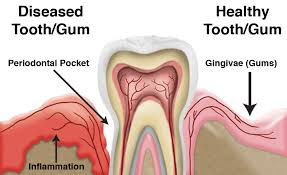GUM DISEASES - MOUTH DEMON
- Dr. Supriya Shekhar
- Sep 28, 2016
- 3 min read
Gum diseases also called as Periodontal diseases begins with the invasion of mouth monsters in the form of biofilm build up, called Plaque. It ends up with bacterial growth in the mouth, leading to destruction of the tissues surrounding the teeth. Gum disease is the leading cause of tooth loss in adults.
STAGES:
GINGIVITIS : In the early stage of gingivitis, the gums seems to be inflamed due to bacteria in plaque build up, causing the gums to bleed during tooth brushing. Although the gums may be irritated, the teeth are still firmly planted in their sockets. No irreversible bone or other tissue damage is seen.
PERIODONTITIS : In periodontitis, The inner layer of the gum and bone pull away from the teeth and form pockets which form spaces between teeth and gums, collect debris and becomes infected. With the disease progression, the pockets deepen and more gum tissue and bone are destroyed. When this happens, teeth are no longer anchored in place, they become loose, and tooth loss occurs.
RISK FACTORS :
The main cause of periodontal (gum) disease is plaque, but other factors affect the health of your gums.
AGE - Older people have the highest rates of periodontal disease.
POOR ORAL HYGIENE HABITS
SMOKING/TOBACCO USE - Most significant risk factors in the development and progression of periodontal disease, making it harder for repairment.
HORMONAL CHANGES - Occurring during pregnancy, puberty, menopause, and monthly menstruation, make gums more sensitive, which makes it easier for gingivitis to develop.
MEDICATIONS - Some drugs, such as oral contraceptives, anti-depressants, and certain heart medicines, can affect your oral health. because some lessen the flow of saliva, which has a protective effect on teeth and gums.
OTHER SYSTEMIC DISEASES - these interfere with the body's inflammatory system may worsen the condition of the gums, includes cardiovascular disease, diabetes, and rheumatoid arthritis, cancer , HIV.
STRESS - This makes body more difficult to fight off infection.
CLENCHING OR GRINDING YOUR TEETH - This puts excess force on the supporting tissues of the teeth and could speed up the rate at which these periodontal tissues are destroyed.
GENETICS - some people may be genetically susceptible to gum disease. Despite aggressive oral care habits, these people may be more likely to develop periodontal disease.
POOR NUTRITION AND OBESITY - A diet low in important nutrients can compromise the body's immune system and make it harder for the body to fight off infection.
WARNING SIGNS AND SYMPTOMS :
Red, swollen or tender gums.
Bleeding while brushing, flossing, or eating hard food.
Gums that are receding or pulling away from the teeth, causing the teeth to look longer than before.
Loose or separating teeth.
Formation of pockets between teeth and gum.
Pus between your gums and teeth.
Sores in your mouth.
Persistent bad breath.
A change in the way your teeth fit together when you bite
A change in the fit of partial dentures
HOW IS GUM DISEASE TREATED?
The goals of gum disease treatment are to promote:
Reattachment of healthy gums to teeth
Reduce risk of infection
To stop disease progression.
Treatment options (surgery or nonsurgical) depend on the stage of the disease.
Nonsurgical therapies that control bacterial growth
Surgery to restore supportive tissues.
PREVENTION
Proper plaque control
Daily brushing and flossing.
Antibacterial mouth rinses.
Visit the dentist on regular basis for professional cleaning.






Comments